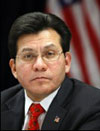|
|
|
Gonzales doesn't satisfy critics - GOP or Dems
Legal Business |
2007/04/20 11:10
|
| The Bush White House called embattled Attorney General Alberto Gonzales "our No. 1 crime fighter" Friday, a day after Gonzales' often halting explanations for the firings of eight federal prosecutors brought additional demands for his resignation. "He has done a fantastic job in the Department of Justice," deputy press secretary Dana Perino told reporters traveling aboard Air Force One as President Bush headed for a speech in Michigan. Gonzales had gone to Capitol Hill Thursday with just one mission: to placate Republican and Democratic senators dissatisfied with his account of how eight federal prosecutors were fired. Apparently, he failed. For the first time, Republicans on the Judiciary Committee broke ranks and said it might be best if Gonzales stepped down. "It is generous to say the attorney general's communications about this matter have been inconsistent," Sen. Tom Coburn, R-Okla., told Gonzales in a packed hearing room Thursday. "The consequence should be the resignation of the attorney general." Sen. Jeff Sessions, R-Ala., said in an interview after the hearing, "There are some problems that he just hasn't handled well, and it might just be best if he came to a conclusion that the department is better served if he's not there." Some of the committee's biggest questions went unanswered: How exactly did the Justice Department settle on the eight prosecutors who were fired? Does Gonzales have command of his agency? "You have been a forceful witness, and you have had a lot of staying power," Sen. Arlen Specter, the ranking Republican on the committee, said near the end of Gonzales' seven hours of testimony. "But we haven't gotten, really, answers," added Specter, R-Pa. "I urged you to put on the record the details as to all the U.S. attorneys you asked to resign so that we could evaluate. And you have not done that." Specter threw Gonzales a thin lifeline, declining to call for his resignation but making it clear that he thinks there's little argument for Gonzales keeping his post. "His ability to manage the department has been severely undercut by the way he has handled these resignations and by the way he has handled his news conferences, his press statements and his testimony before the committee," Specter said.
|
|
|
|
|
|
|
Indian company buys U.S. iron ore firm
World Business News |
2007/04/20 10:07
|
Essar Global Ltd, India's leading industrial company, has signed an agreement to acquire Minnesota Steel LLC, a U.S.-based iron ore firm, local media reported Thursday. According to Daily News Analysis published in Mumbai, the deal will cost Essar Global 80 million to 90 million dollars. The Minnesota Steel LLC controls 1.4 billion tons of iron ore in the Mesabi Iron Range in northeast Minnesota in the United States. "Our investment in Minnesota Steel is exciting as it gives us a cornerstone in the North American market. From this we will further expand our global steel business," said Shashi Ruia, Essar Global chairman. Moreover, the deal marked the first step of Essar Global to setup steel making facility with an annual capacity of 1.5 million tons and investment of 1.65 billion U.S. dollars. The facility will include iron ore mining, ore processing, direct reduction and steel making on a single site. |
|
|
|
|
|
|
Baker & McKenzie Advises MacarthurCook
Law Firm News |
2007/04/20 08:41
|
Baker & McKenzie's Asia Pacific REIT team has assisted MacarthurCook, one of Australia’s emerging international real estate investment managers, on the successful acquisition of 12 Singapore industrial properties for S$316.2 million (US$208 million). The properties formed the initial portfolio of the MacarthurCook Industrial REIT (“MI-REIT”), which commenced trading on the Main Board of Singapore Exchange Securities Trading Limited (the “SGX-ST”) yesterday. It is intended that more industrial properties will be acquired in Asia for the MI-REIT.
Baker & McKenzie's Asia Pacific REIT team for this transaction was co-led by the partners Ai Ai Wong in Singapore and Lewis Apostolou in Melbourne who worked collaboratively with support from lawyers in Singapore and Australia.
Commenting on the deal in Singapore, Ai Ai Wong said: “This is a very exciting time for MacarthurCook particularly as the new MI-REIT will enable our client to achieve their principal investment objective of owning and investing in a diversified portfolio of income-producing real estate located throughout Asia.” Lewis Apostolou, in Melbourne, Australia, added: “We are delighted to have had the opportunity to continue our collaboration with MacarthurCook, and to assist them as they successfully expand their investment management business internationally.”
This is the second time Baker & McKenzie has acted for MacarthurCook in connection with a Singapore offering, having concluded the secondary listing of the MacarthurCook Property Securities Fund on the Singapore Stock Exchange in December 2006. On that occasion, Baker & McKenzie acted as Australian legal counsel, and Colin Ng & Partners as local counsel in Singapore.
The new MI-REIT contributes to the growing track record that Baker & McKenzie’s Asia-Pacific REIT team has built over the last 18 months, with the team acting on a number of strategic REIT deals including:• Advising ARA Asset Management (Prosperity) Limited, the Manager of Prosperity REIT, on its IPO, listing and post IPO property acquisitions in Hong Kong. • Advising Guangzhou Investment Company Limited (GZI) on the establishment and listing of GZI REIT - the first listed REIT with PRC mainland properties on the Hong Kong Stock Exchange. • Advising GuocoLand (Malaysia) Berhad on the establishment and IPO of the Tower REIT on the Malaysian Stock Exchange. • Acting for the issuer Fubon Financial on the IPOs and listings of both the Fubon No.1 and No. 2 REITs on the Taiwan Stock Exchange. • Advising the underwriter of the Tokyo Growth J-REIT which consists of 46 offices and residential properties and is listed on the Tokyo Stock Exchange.
Baker & McKenzie’s Global REIT team is also active in other REIT markets around the world including in Europe, where new REIT legislation continues to be introduced by European governments. |
|
|
|
|
|
|
Former Qwest CEO Nacchio is guilty on 19 counts
Securities |
2007/04/20 08:30
|
| Former Qwest Communications CEO Joseph Nacchio was convicted Thursday by a federal jury on 19 of 42 counts of insider trading. Nacchio illegally sold 1.33 million shares valued at $52 million dollars in conjunction with the Denver-based telephone service provider's account scandal between April 26 and May 29, 2001. Nacchio faces a maximum sentence for each count of up to 10 years in prison and a $1 million fine. The federal jury acquitted Nacchio of 23 counts of insider trading originating before April 2001. Nacchio's sentencing is slated for July 27, and he is currently free on $2 million bail. Nacchio and other former Qwest executives still face a class action lawsuit and civil charges brought by the Security and Exchange Commission. Another former Qwest employee, ex-Vice President Marc Weisberg, pleaded guilty to wire fraud in December 2005 and helped prosecutors build their case against Nacchio. |
|
|
|
|
|
|
House passes DC congressional voting rights bill
Law Center |
2007/04/20 07:30
|
| The US House of Representatives passed the District of Columbia House Voting Rights Act (HR 1905) Thursday, which could increase official House membership for the first time since 1960. The bill, which passed 241-177, would make the District of Columbia a congressional district with full voting rights in the House, and as a compromise with Republicans, add a temporary at-large seat for Utah. Utah came close but fell short of obtaining a new district after the 2000 census. The future of the bill in the less Democratically-dominated Senate is far from certain, however, and President George W. Bush has threatened a veto, calling the bill unconstitutional. The District of Columbia currently has a delegate in the House, Eleanor Holmes Norton, who is able to vote in committee and on some amendments, but is not allowed to vote on the final passage of a bill. A February report by the Congressional Research Service flagged the potential unconstitutionality of any bill granting a House vote for the District, focusing on the language in Article I, Section 2, Clause 1 of the Constitution that the House is to be comprised by the "people of the several States." |
|
|
|
|
|
|
Anti-Castro militant released from US custody on bail
International |
2007/04/20 05:33
|
Cuban anti-Castro militant Luis Posada Carriles posted bond and was released from a New Mexico jail on Thursday after ongoing debate about his release. Carriles, 79, a former CIA operative trained by the US for the failed anti-Castro Bay of Pigs invasion in 1961, was arrested in 2005 for illegally entering the United States and had been under the custody of immigration officials. Earlier this month, US District Judge Kathleen Cardone ruled that Carriles should be released, and set bail at $250,000. Federal prosecutors filed an emergency motion appealing the ruling, to keep him in jail pending his immigration trial. On Tuesday, the US Court of Appeals for the Fifth Circuit ruled that Carriles could post bond and be released, after ordering a temporary injunction Friday blocking his release until a final ruling this week. Carriles will remain under house arrest and electronic surveillance, as required by the court order. Carriles is due to be deported for entering the US illegally. A US immigration judge delayed his deportation in 2005, after having determined that Carriles cannot be sent to Venezuela, where he is a naturalized citizen, or to Cuba, the country of his birth, for fears that he would be tortured. Carriles is accused of orchestrating the 1976 bombing of a Cuban airliner, as well as numerous assassination attempts on Cuban President Fidel Castro, and has previously sought asylum in the US. Earlier this week, a lawyer representing the government of Venezuela accused the US of preventing Carriles' extradition and obstructing justice. Castro issued a statement condemning the district court's ruling [JURIST report]. Carriles is wanted in both countries on terrorism charges. |
|
|
|
|
|
|
DOJ seeks dismissal of Guantanamo habeas cases
Breaking Legal News |
2007/04/20 05:32
|
The US Department of Justice (DOJ) on Thursday sought the dismissal of all pending Guantanamo Bay detainee habeas corpus cases in the US District Court for the District of Columbia. The motion to dismiss was filed in response to the US Supreme Court denying petitions for certiorari earlier this month on two cases challenging the Military Commissions Act (MCA). The US Court of Appeals for the DC Circuit had upheld the habeas-stripping provisions of the act in February. In Thursday's motion, the DOJ argued that February's motion, and this month's denial of cert, means that all litigation should be in the DC Circuit. The DOJ stressed that lawyers will continue to be allowed to meet with their clients during a "reasonable transition period," but in the future, client-visit priority will be given to lawyers who are pursuing litigation in the DC Circuit court. The MCA, signed into law last October, denies federal courts the right to hear habeas corpus petitions. Shortly after the bill was enacted, the DOJ notified the DC Circuit that it no longer had authority to hear such cases. The court had stayed the almost 200 cases affected by the act, pending the legal challenges to the MCA. |
|
|
|
|
|
|
Class action or a representative action is a form of lawsuit in which a large group of people collectively bring a claim to court and/or in which a class of defendants is being sued. This form of collective lawsuit originated in the United States and is still predominantly a U.S. phenomenon, at least the U.S. variant of it. In the United States federal courts, class actions are governed by Federal Rules of Civil Procedure Rule. Since 1938, many states have adopted rules similar to the FRCP. However, some states like California have civil procedure systems which deviate significantly from the federal rules; the California Codes provide for four separate types of class actions. As a result, there are two separate treatises devoted solely to the complex topic of California class actions. Some states, such as Virginia, do not provide for any class actions, while others, such as New York, limit the types of claims that may be brought as class actions. They can construct your law firm a brand new website and help you redesign your existing law firm site to secure your place in the internet. |
Law Firm Directory
|
|







